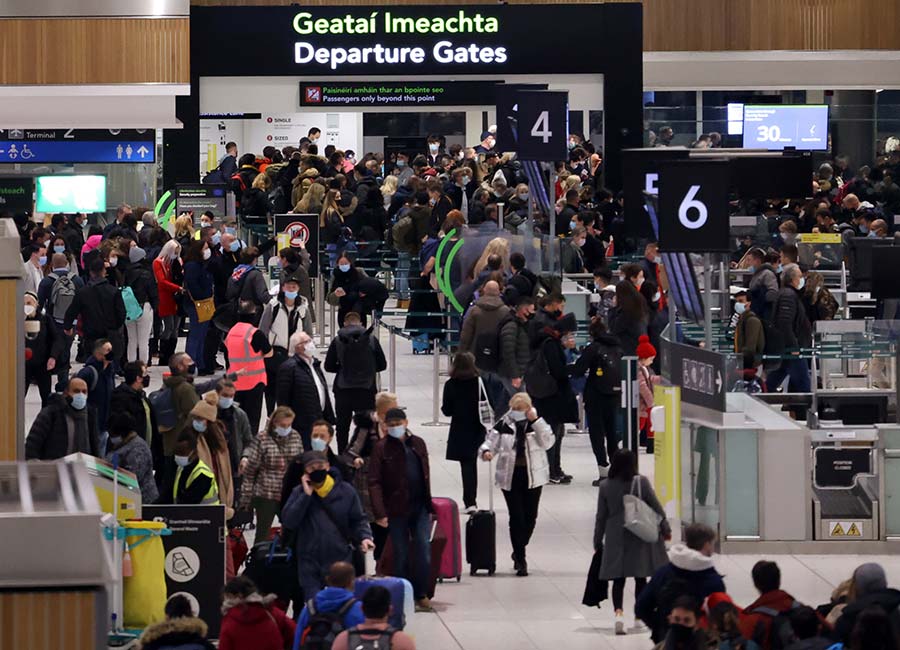New passenger charges for Dublin Airport set by the Commission for Aviation Regulation have been criticised by both the airport operator and Ryanair, the airport’s largest customer.
CAR is responsible for setting airport charges in the best interest of airlines and passengers, with a mandate to balance efficiency with the delivery of high quality services and infrastructure.
The higher the charge, the better for DAA, the airport operator. The lower the charge, the better for Ryanair and other airlines.
CAR has set an average base price cap of €7.59 per passenger in 2023 and with price caps of €7.53, €7.48 and €7.77 in 2024, 2025 and 2026 respectively.
This compares to the average €8.52 CAR proposed in its draft decision. If Dublin Airport delivers its capital investment programme as planned, the real price cap will increase up to €9.57 per passenger by 2026, the CAR stated.
CAR estimates that the price cap will allow Dublin Airport collect €2.8bn in revenue - €1.4bn from airport charges over the four years, and a further €1.4bn from commercial activities such as retail, car parking and property rental, in nominal terms.
Deputy commissioner David Hodnett commented: “We expect the level of service delivered by Dublin Airport to return to pre pandemic levels throughout the period. We have allowed sufficient levels of operating costs to achieve the high quality service levels we have specified, with associated rebates and bonuses to incentivise delivery.
“The price cap reflects confidence in the continued recovery in aviation, and will facilitate further growth by setting efficient charges.
“We expect passenger numbers at Dublin Airport to be at 31.7m in 2023, which is 96% of 2019 levels.
“With the recovery of aviation it is timely for Dublin Airport to invest significantly in key pieces of national infrastructure. We have made capital investment allowances of c€3bn, which when completed by Dublin Airport will provide capacity to handle 40 million passengers per year at a high level of service.
“In our price cap calculations, we also make allowances for investments of €425m to enable Dublin Airport to achieve its sustainability targets.”
An unnamed DAA spokesperson said the passenger charge caps will have a detrimental impact on the number of staff in security, cleaning and other roles at the airport over the next four years.
“This runs contrary to the interests of airport users, our passengers and airline partners, who share our desire for efficiency, high quality service and investment in vital strategic infrastructure,” said the company.
“CAR’s consultants are disallowing security staff each year and up to 240 of the staff needed at Dublin Airport by 2026, which greatly undermines DAA’s proposition to keep queues below 30 minutes, a CAR service quality target.”
DAA contends that the charge caps disregards the operational lessons learned from Covid-19 and the necessity for even greater staff numbers in key operational areas.
“While any change in passenger charges has virtually no discernible impact on the price an airline charges for a flight, it has a material effect on the standard of customer service and the level of capacity that Dublin Airport is able to provide, as we have repeatedly warned over a number of years,” the company stated.

“Yet again the Irish taxpayer is short changed by CAR in its financial allowances for airport staffing, despite the obvious needs of passengers and customers.”
Ryanair complained that CAR has “inexplicably rewarded Dublin Airport with a price hike despite the fact that other airports are reducing charges as they try to recover lost traffic post-Covid and drive passenger growth”.
Ryanair CEO Eddie Wilson stated: “This unwarranted price increase at Dublin Airport is driven by excessive operating costs and a €3bn set of ‘gold plated’ capital investment projects, including an unnecessary €200m tunnel which airline customers and passengers don’t want yet will be forced to pay for over the next four years.
“CAR is once again fuelling DAA’s ‘tunnel vision’ at the expense of airline customers and passengers by allowing Dublin Airport to increase its charges by up to 45% by 2026, and with no benefit to passengers or Ireland’s tourism recovery.”
Wilson added: “It is not too late for Dublin Airport to come to its senses and abandon some of the wasteful projects behind this 45% price increase and instead deliver the capacity required to boost Ireland’s tourism and economy.”
Wilson called on new DAA CEO Kenny Jacobs – a former Ryanair colleague - to review all projects his predecessors promoted in recent years "and scrap those which do nothing for service quality for passengers or capacity for the Irish economy".








